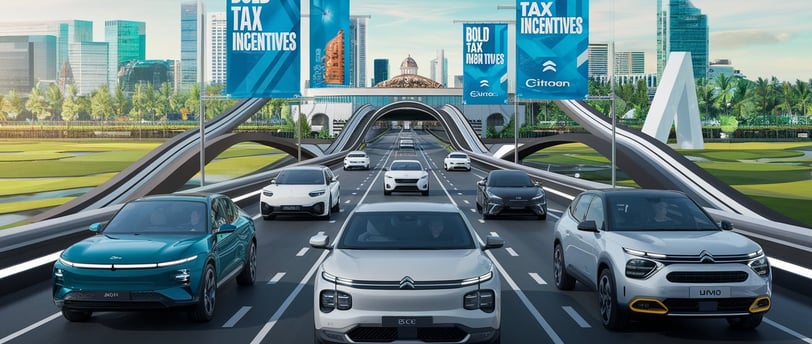"Indonesia Lures Global EV Giants with Bold Tax Incentives: How BYD, GAC Aion, and Citroen Are Shaping the Future of Southeast Asia’s Electric Revolution"
Indonesia is positioning itself as a key player in Southeast Asia’s electric vehicle revolution by offering bold tax incentives to global EV giants like BYD, GAC Aion, and Citroen. This strategic move aims to attract top automotive manufacturers to invest in the country, helping to drive the region's transition to cleaner, more sustainable transportation options. As a result, Indonesia is shaping the future of electric mobility in the heart of Southeast Asia.
evnovatech.com
12/17/20244 min read


"Indonesia Lures Global EV Giants with Bold Tax Incentives: How BYD, GAC Aion, and Citroen Are Shaping the Future of Southeast Asia’s Electric Revolution"
Indonesia’s Ambitious Leap into the EV Era.
Indonesia is revving up its engines to become a powerhouse in electric vehicle (EV) production. With its new tax incentive program aimed at global automakers like China’s BYD and GAC Aion, and France’s Citroen, Southeast Asia’s largest economy is making a bold play to position itself as a leader in the region’s green mobility revolution. These incentives underscore Indonesia’s commitment to transitioning to cleaner energy, leveraging its vast nickel reserves and strategic location to court foreign investment and establish itself as a major EV manufacturing hub.
Tax Breaks and Competitive Edge
Starting in January 2024, manufacturers committing to local production will enjoy a range of incentives designed to make Indonesia an attractive destination for EV investments. Import taxes will be waived, and manufacturers will benefit from a reduced luxury sales tax (PPnBM) rate of just 15%. These measures aim to reduce production costs and make EVs more affordable for Indonesian consumers.
At a press conference on Monday, Agus Gumiwang Kartasasmita, Indonesia’s Minister of Industry, emphasized the broader vision behind these incentives. “This initiative showcases Indonesia’s competitive regulatory environment and aligns with our goal to make the country a production hub for battery-powered EVs in the ASEAN region,” Agus stated.
Why Indonesia is Betting Big on EVs
Indonesia’s aggressive push into the EV market stems from its rich reserves of nickel, a key component in lithium-ion batteries. By leveraging these resources, the country hopes to attract global EV manufacturers and establish a self-sufficient supply chain. Already, Indonesia’s first EV battery plant—a $1.1 billion venture by Korean giants Hyundai and LG—is operational, signaling the country’s readiness to support large-scale EV production.
The government’s strategy is clear: reduce dependence on fossil fuels, cut emissions, and tap into the booming global EV market. By offering tax breaks and other incentives, Indonesia aims to fast-track its journey toward becoming a green energy leader.
BYD: A Game-Changer for Indonesia’s EV Landscape
Leading the charge in Indonesia’s EV transformation is Shenzhen-based BYD, the world’s largest manufacturer of battery and plug-in hybrid vehicles. In January 2023, BYD made its debut in Indonesia with three flagship models: the Seal, Atto 3, and Dolphin. The company also inked a deal with Blue Bird, Indonesia’s largest taxi operator, to supply EVs, a partnership that promises to reshape urban mobility in the country.
BYD’s commitment goes beyond vehicle sales. The company has pledged a $1.3 billion investment to build an EV plant in West Java. Set to begin operations in January 2026, the plant will have an annual production capacity of 150,000 vehicles. According to Eagle Zhao, BYD’s Indonesia president, the company aims to establish a robust sales network of up to 50 locations by the end of 2024, ensuring widespread availability of its vehicles.
GAC Aion: Scaling Up Local Production
Another key player is GAC Aion, the EV division of China’s state-owned GAC Group. Expanding to Indonesia in April 2023, GAC Aion partnered with local distributor Indomobil Group to establish a foothold in the market. The Guangzhou-based company is currently building a production plant in Indonesia, following the successful launch of its Thailand factory in mid-2023.
GAC Aion has set ambitious localization goals. By 2027, it aims to source at least 40% of its components from local suppliers, increasing to 80% in the coming years. This approach not only reduces production costs but also aligns with Indonesia’s vision of fostering a domestic EV supply chain.
“Our aim is to create an ecosystem that benefits the local economy while meeting global standards,” said Andry Ciu, CEO of Aion Indonesia, in a recent interview.
Citroen Joins the EV Revolution
Not to be left out, French automaker Citroen has also committed to establishing a production base in Indonesia. With its legacy of innovation and design, Citroen’s entry adds a European flavor to Indonesia’s burgeoning EV industry. While details of Citroen’s investment are yet to be disclosed, its participation signals growing global confidence in Indonesia’s EV potential.
Challenges and Opportunities
Despite its rapid progress, Indonesia faces challenges in making EVs affordable for its population. Currently, the price of EVs in Indonesia is approximately 3.5 times that of traditional internal combustion engine vehicles, according to Blue Bird’s president commissioner, Noni Purnomo. However, local manufacturing initiatives, like BYD’s upcoming plant, are expected to significantly lower costs.
The government’s target to produce 600,000 EVs by 2030—a staggering increase from the 6,000 units sold in the first half of 2023—reflects the scale of ambition. Achieving this goal will require continued investment in infrastructure, including charging networks, and fostering public awareness about the benefits of EVs.
The Global Context: Navigating Trade Barriers
Indonesia’s EV ambitions are unfolding against a backdrop of shifting global trade dynamics. Chinese EV makers, facing tariff hikes from the U.S. and the European Union, are increasingly looking to Southeast Asia for growth. Indonesia’s proactive policies offer a safe haven for these companies, enabling them to expand their footprint without the burden of punitive trade measures.
Conclusion: A Green Future Beckons
Indonesia’s tax incentives mark a significant step in its journey toward becoming an EV manufacturing powerhouse. By attracting global giants like BYD, GAC Aion, and Citroen, the country is not just bolstering its economy but also taking a leadership role in the global transition to sustainable mobility. With its rich natural resources, strategic location, and investor-friendly policies, Indonesia is poised to lead Southeast Asia’s electric revolution.
FAQ: All You Need to Know About Indonesia’s EV Tax Incentives
Q1: What tax incentives is Indonesia offering to EV manufacturers?
Indonesia is offering a full exemption on import taxes and a reduced 15% luxury sales tax (PPnBM) for EV manufacturers that commit to local production.
Q2: Which companies are benefiting from these incentives?
Chinese automakers BYD and GAC Aion, as well as French company Citroen, are among the key beneficiaries. All three have committed to building factories in Indonesia.
Q3: When will the incentives take effect?
The tax incentives will be implemented starting January 2024.
Q4: Why is Indonesia focusing on EV production?
Indonesia aims to leverage its rich nickel reserves—a critical component in EV batteries—to build a domestic EV industry and reduce reliance on fossil fuels.
Q5: What are Indonesia’s EV production targets?
By 2030, Indonesia plans to produce 600,000 EVs annually, a significant jump from the current market size.
Q6: How will these incentives impact EV prices in Indonesia?
Local production is expected to lower EV prices significantly, making them more accessible to Indonesian consumers.
Q7: What challenges does Indonesia face in achieving its EV goals?
Key challenges include high initial EV costs, the need for infrastructure development, and ensuring a steady supply chain for local production.
